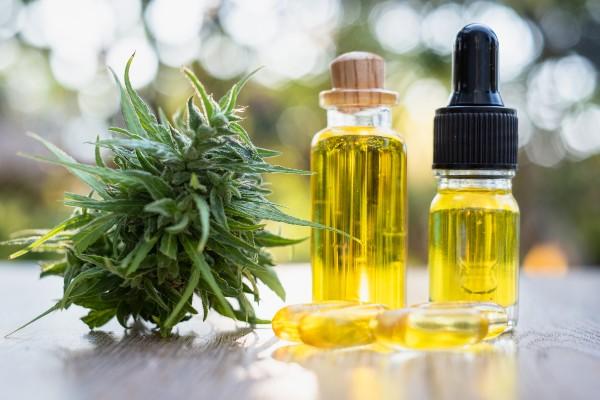What is CBD?
The complete guide to CBD (cannabidiol)
CBD (cannabidiol) is a therapeutic compound produced by cannabis. It is commonly extracted and processed into oils, gummies, topicals, and other products that have no doubt sparked your curiosity. And with curiosity comes a load of questions.
This guide is here to lend a hand and provide answers to consumers’ most common questions about CBD, starting with the most basic so you never feel lost. You can start from the beginning or jump straight to whichever CBD question is currently burning hottest for you.
What is CBD (cannabidiol)?
CBD, or cannabidiol, is a non-intoxicating compound found in cannabis and hemp. CBD oils, gummies, and other products are continuing to grow in popularity as ways to manage anxiety, stress, pain, and other symptoms.
We typically associate cannabis with getting stoned, but CBD can be extracted from the plant to make products that come without the high or the smoke. The molecule in cannabis that gets us high is called THC (tetrahydrocannabinol), and nowadays, you can turn to cannabis-derived CBD products with little to no THC for clear-headed symptom relief.
It’s not just THC and CBD, either—cannabis produces dozens of potentially therapeutic compounds called cannabinoids. We’re slowly getting to know them as legalization spreads, and so far, they seem pretty friendly to us humans and our many ailments.
How does CBD work in the brain and body?
Each of our bodies has a set of receptors that interacts with cannabis compounds called cannabinoids, like CBD. These receptors, found throughout the body, comprise the endocannabinoid system (ECS), a complex signaling system that ensures our bodies maintain homeostasis.
Put another way, the endocannabinoid system keeps us in balance by directing the communication traffic in our bodies. Cannabinoids such as CBD interact with this system, mimicking natural compounds (called endocannabinoids) produced by the body.
In the human body, CBD influences cannabinoid receptor activity and encourages production of the body’s natural endocannabinoids. Interestingly, CBD also affects activity beyond the endocannabinoid system and can also interact with opioid, dopamine, and serotonin receptors. The ability of CBD to interact with so many different systems throughout the body suggests it has the potential to open new frontiers in psychiatry and medicine.
Can CBD make you feel high?
Unlike THC, CBD is not intoxicating. Why? Both THC and CBD are cannabinoids, but they behave very differently in our bodies.
THC stimulates what are called CB1 receptors. When CB1 receptors are activated, humans generally experience feelings of euphoria—or, for some, anxiety and paranoia. CBD doesn’t activate CB1 receptors, so we don’t feel euphoric, anxious, or stoned when taking it.
In fact, CBD can actually reduce THC’s ability to stimulate CB1 receptors, helping to block some of THC’s not-so-fun side effects. For those prone to anxiety and forgetfulness when consuming cannabis, CBD is a good tool to keep on-hand.
What are some conditions CBD can potentially treat?
CBD is a compound with diverse medical potential, so it’s no surprise that it’s become a trendy “cure-all” in the wellness space of late. Considering there’s currently no supervision over ingredients in CBD oil and other products, or the medical claims tied to them, it’s OK to be skeptical. We encourage that.
These claims often begin with anecdotal evidence, early research, and animal studies, but human studies are finally starting to fill in the gaps around CBD’s touted benefits. With that caveat in mind, here’s what we understand about CBD’s potential therapeutic applications.
CBD and anxiety
Ask around and we don’t doubt you’ll find a friend, relative, or acquaintance who swears by CBD for anxiety and stress relief. And there’s no reason yet to doubt it; so far, a majority of CBD research suggests it may be beneficial for anxiety symptoms, possibly by influencing activity in the serotonin system.
For quick relief of acute stress and anxiety, consider vaporizing high-CBD strains that also contain an array of botanical compounds—or try a clean, lab-tested CBD oil. Ingesting CBD oil may also help alleviate anxiety on the fly, but the effects are not instantaneous.
CBD and pain
According to research so far, CBD seems to help with two types of pain: neuropathic and inflammatory. For other types of pain, CBD appears to be less effective. The euphoria-causing cannabinoid THC appears to also lend pain-relieving benefits, so if that’s your use-case, you might consider a product with both CBD and THC. You may even consider starting with a low dose of THC (2.5 to 5mg)—one likely to deliver little to no detectable high—to see if it enhances the painkilling power of CBD.
Not only can cannabis help supplement and replace a regimen of opioid painkillers, cannabis appears to enhance the effects of opioids, allowing some patients to cut back their regular dose of pharmaceutical painkillers.
CBD and insomnia
The relationship between CBD and sleep isn’t well understood yet. So far, it appears that dosage plays a role, with higher doses appearing to be more effective than lower doses. For context, one study indicated that a 160mg dose of CBD correlated with longer sleep duration, while 25mg of CBD seemed to have no effect on insomnia symptoms.
Another consideration: What’s keeping you up at night? CBD may help with symptoms that cause sleeplessness. If pain, anxiety, or stress is keeping you from settling into sleep, CBD just might be your ticket to a peaceful mind and body—and restful sleep.
CBD and epileptic seizures
For children with epilepsy, many treatment options drag along a host of side effects that impact one’s quality of life. So when CBD began to show promise as an effective treatment for seizures with little in the way adverse effects, researchers started paying attention.
In 2018, the FDA approved a CBD-based medicine called Epidiolex for treating two forms of epilepsy—Dravet syndrome and Lennox-Gastaut syndrome.
Although anecdotal evidence and early studies show promising results, researchers haven’t yet reached a scientific explanation for why CBD might help reduce seizures.
Continue reading on Leafly. https://www.leafly.com/news/cannabis-101/what-is-cbd
